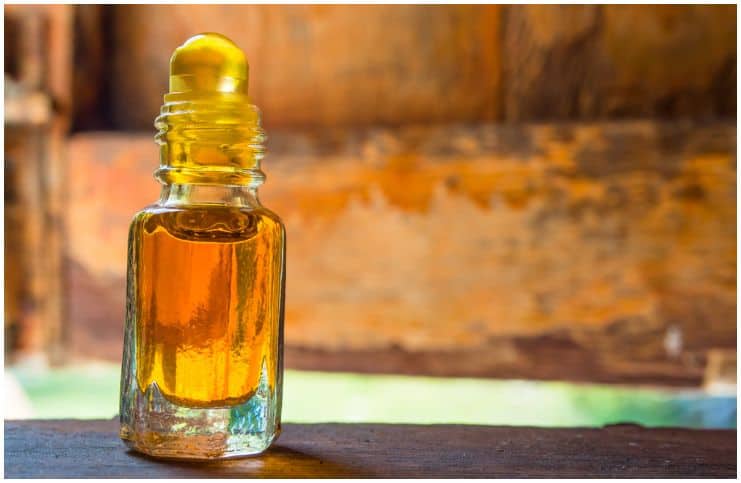Camphor Oil – Side Effects + Health Benefits:
Camphor, a natural product derived from the wood of the tree Cinnamomum camphora, has a long history of use as an analgesic, antiseptic, antipruritic, rubefacient, and counterirritant.
For over 5,000 years, Ayurvedic medicine has utilized it primarily as a germ killer.
Cinnamomum camphora is found in Asia (especially in Sumatra, Indonesia, and Borneo) and is a member of the Lauraceae family. It is an evergreen tree that can reach up to 40 meters in height and live to be greater than 1,000 years old.
The word „camphor” derives from the French word ”camphre,” itself from Medieval Latin camfora, from Arabic kafur.
Chemical Composition
The major chemical components of the oil are – α-thujene, camphene, α-pinene, trans-pinene, sabinene, β-pinene, β-myrcene, 8-diene, α-terpinene, p-cymene, linalool, α-phellandrene, limonene, 1,8-cineol, γ-terpinene, trans-β-ocimene, cis-ocimene, terpinolene, camphene hydrate, cis-tagetone, nerol oxide, borneol and 4-terpineol.
Health Benefits
Relieves Inflammations
Inflammation in the body happens to everyone, whether you realize it or not. However, chronic inflammation has been shown to be the common link among the leading causes of:
- premature aging;
- allergies;
- asthma;
- depression;
- Alzheimer’s disease;
- autoimmunity;
- cancer;
- diabetes;
- heart disease;
- disability.
This oil has powerful anti-inflammatory properties, which makes it an amazing addition in ointments. Applying it on a wound can reduce swelling and speed up the healing process. Additionally, it is very effective in relieving muscle pain.
It also works as an analgesic, because when it’s applied to the painful area, it will numb it and soothe the pain.
Antioxidant Properties
A 2005 study, by the Department of Plant Protection, on camphor extracts concluded that it has a significant amount of antioxidants in it.
Antioxidants are substances that help prevent the damaging effects of oxidation on cells throughout your body, which can cause the creation of free radicals.
Free radicals can cause damage to parts of cells such as DNA, proteins, and cell membranes, and may lead to ailments such as liver disease, diabetes, cardiovascular disease, and even cancer.
Respiratory Problems
Inhaling the vapor of this oil offers numerous beneficial benefits, such as clearing up the mucus and facilitating normal breathing by eliminating congestion of the nasal, lungs, and bronchial tracts.
Thus, it is one of the essential ingredients in the manufacturing of lozenges, balms, and cold rubs.
Skin Health
Many beauty lotions and creams have camphor as an ingredient. You can add small amounts of it in your face pack to get rid of acne and acne scars on the face. Its antimicrobial properties help remove excess oil from the skin.
It is useful for neurodermatitis, which is a skin condition in which the skin becomes itchy, and it can develop anywhere on the surface of the body.
Also, people use it as a medicine to relieve skin itching and cure pain. But make sure not to use it on cuts and open wounds.
Insect Repellent
It is a popular insect and moth repellent. Soaking a piece of cloth in the oil and leaving it in the open makes the lingering fragrance drive away insects like mosquitoes, fleas, and flies.
In addition, this oil is also useful for eradicating head lice and for repelling germs from the household. Chunks of the ingredients can be placed on the cupboards in order to repel moths.
Side Effects Of Camphor Oil
In 1980, the FDA set a limit of 11 percent allowable in consumer products. Since alternative treatments exist, medicinal use of the oil is discouraged by the Food and Drug Administration, except for skin-related uses, such as medicated powders, which contain only small amounts of oil.
This oil is poisonous in large doses. It produces symptoms of disorientation, irritability, lethargy, vomiting, muscle spasms, abdominal cramps, convulsions, and seizures. Lethal doses in adults are in the range of 50 to 500 mg/kg (orally). Two grams cause serious toxicity, and 4 grams are potentially lethal.
People with epilepsy or asthma, as well as pregnant women and children, should not use it to avoid any adverse effects. Be sure to consult with a healthcare specialist prior to using this essential oil.


